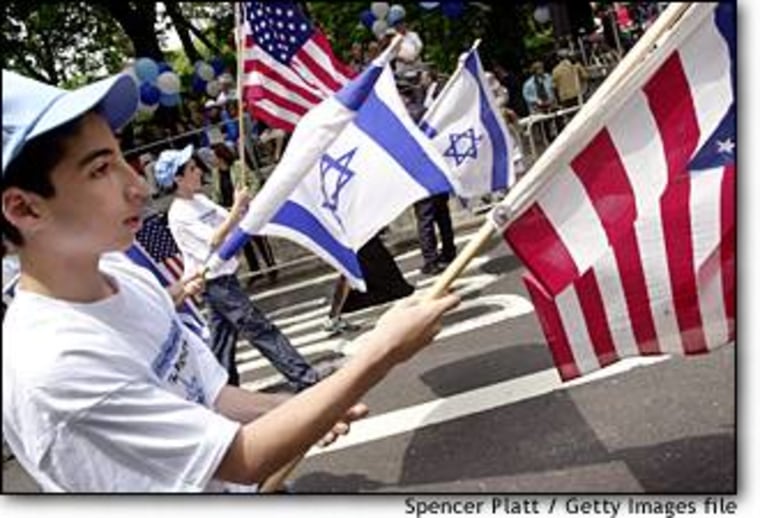In this city, where any schlemiel knows the difference between a bagel and knish, the revival of the Israeli-Palestinian peace process is more than just a topic of conversation. New York’s Jewish community, the largest and most influential in the nation, has deep personal ties to Israel and is keeping a sharp eye on developments. In spite of violence and previous dashed hopes, many see a possibility that this time could be different.
RABBI NILES ELLIOT GOLDSTEIN is among the more progressive Jewish leaders in New York. As the national Jewish chaplain for the Federal Law Enforcement Officers Association, he holds the Middle East to the same standards of safety and security as the police force in New York.
“I find the notion of Israel, living next to a world-recognized state that still tolerates and has not yet eradicated terrorism from within its borders to be a repugnant idea,” said the 37-year-old founding rabbi of The New Shul in lower Manhattan.
Yet Goldstein also recognizes that after so many years of violence, peace will not come without hard work.
“There has to be trust-building measures on both sides. Baby steps, then work your way towards the ultimate goal of two separate states,” said Goldstein, the author of “God at the Edge, Searching for the Divine in Uncomfortable and Unexpected Places.”
The U.S.-backed road map provides the small steps to which he refers. The three-stage plan calls for an end to terror attacks and a settlement freeze in the first stage, a Palestinian state with temporary borders in the second, and a final status agreement with detailed solutions by the year 2005.
However, as simple as the road map may seem, “the devil is in the details,” said Goldstein.
Details like the removal of some 200,000 Jewish settlers from the West Bank and Gaza strip, a plan that Goldstein wholeheartedly supports.
“Just as the Palestinian Authority needs to confront and eradicate the terrorists within their midst, so too does the Israeli government need to confront and remove most of the settlers and settlements that are wreaking havoc on the peace process,” argues Goldstein. “I don’t think they (the settlers) are terrorists, but the situation that they have brought about and are perpetuating has on occasion led to murder.”
STRONG SECURITY
In uptown Manhattan, two leaders from opposite ends of the Jewish community echo the need for strong security for Israel before the road map can be fully implemented.
Like many in the orthodox community, Richard Stone, the chairman of the Orthodox Union’s Institute for Public Affairs, has close ties to the biblical notion of the land of Israel, the area that include the West Bank and Jordan. However, he supports the idea of concessions in order to achieve a meaningful peace.
“In Israel, we clearly have a government with a strong hand firmly committed to preventing terrorist acts,” said Stone, who is also a professor of law at Columbia University. “We need the same thing in the leadership from the Palestinian state. We have not seen the willingness, nor the power to do it.”
Rabbi Peter Rubinstein, the leader of one of the Manhattan’s oldest and largest Reform congregations, the Central Synagogue, takes a strong stand on the need to protect Jews living on the borders of the disputed territories and the necessity of Palestinian security to crack down on militants attempting to destroy the peace process.
“In a post 9/11 world none of us can really define security. For Israel, it starts with the reigning in of all terrorist activity in the region,” said Rubinstein.
“Some of what are called settlements are really neighborhoods — the suburbs of Tel Aviv. The border needs to be drawn to include those.”
Even Jewish leaders who dispute the idea of a Jewish state agree that Israel needs to protect its citizens.
“While Israel is an illegitimate entity in my mind, I still believe it deserves to be secure,” said Rabbi Chaim Stauber of the ultra-Orthodox Satmar hasidic sect. “I support the idea of land for peace. There is no justification to the loss of a single human being.”
JERUSALEM: A STICKING POINT?
One particular sticking point in the implementation of the road map may come during the final status negotiations for Jerusalem, as it did at the Camp David talks in 2000 between President Clinton, Israeli Prime Minister Ehud Barak and Palestinian leader Yasser Arafat. As outwardly accepting as Jewish leaders are about possible negotiations relating to the settlements and political governments, they are more reticent when it comes to giving up full Israeli control of the capital city.
“I feel a lot less comfortable about sharing Jerusalem than I do about the two-state idea,” said Goldstein. “Unless or until the Palestinian Authority has proven it will and can allow Jews free, safe and unfettered access to their own sacred sites, the question of sovereignty over those sites is still something that needs to be discussed.”
For all the support Israel gets from the American Jewish community, it is willing to admit that the Jewish state is not infallible.
“I am certainly willing to admit that Israel has done its share of mistakes,” said Goldstein. “This conflict has to change because both societies are becoming rotten from within: morally and spiritually.”
